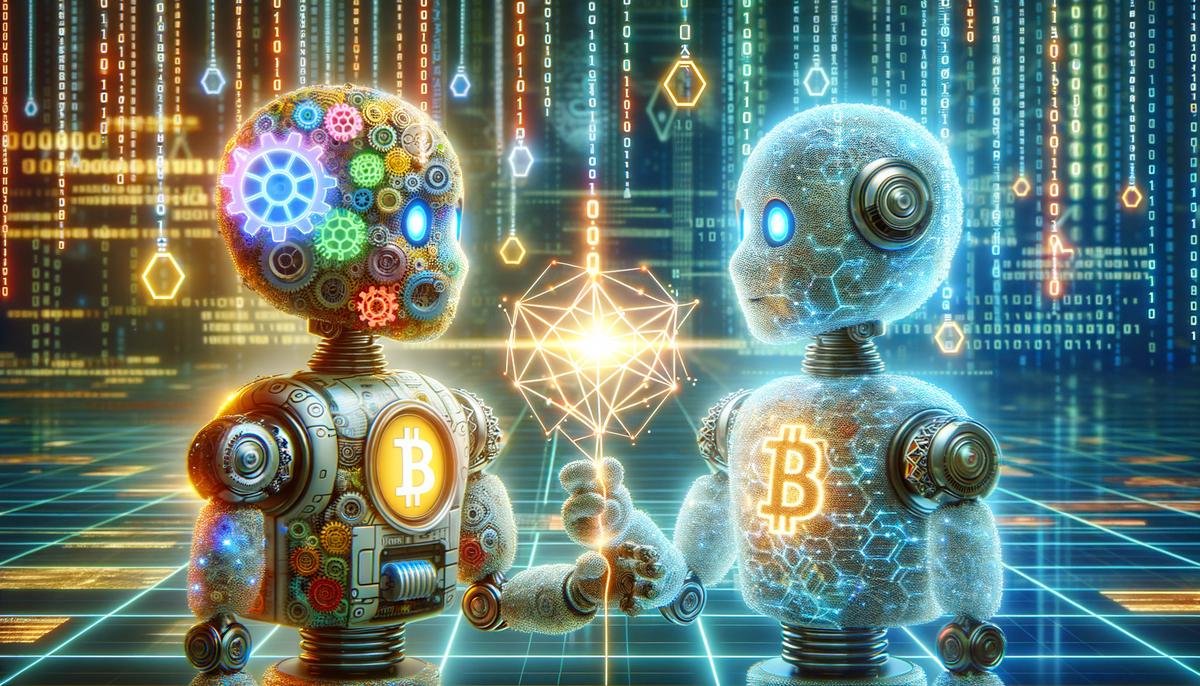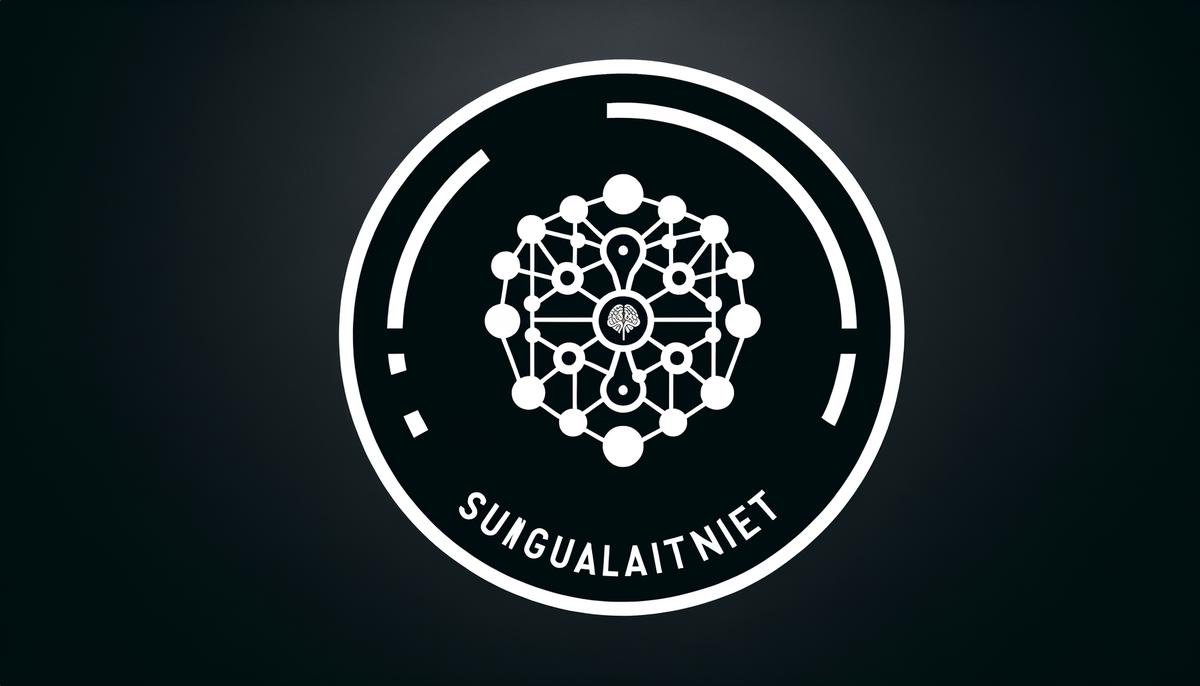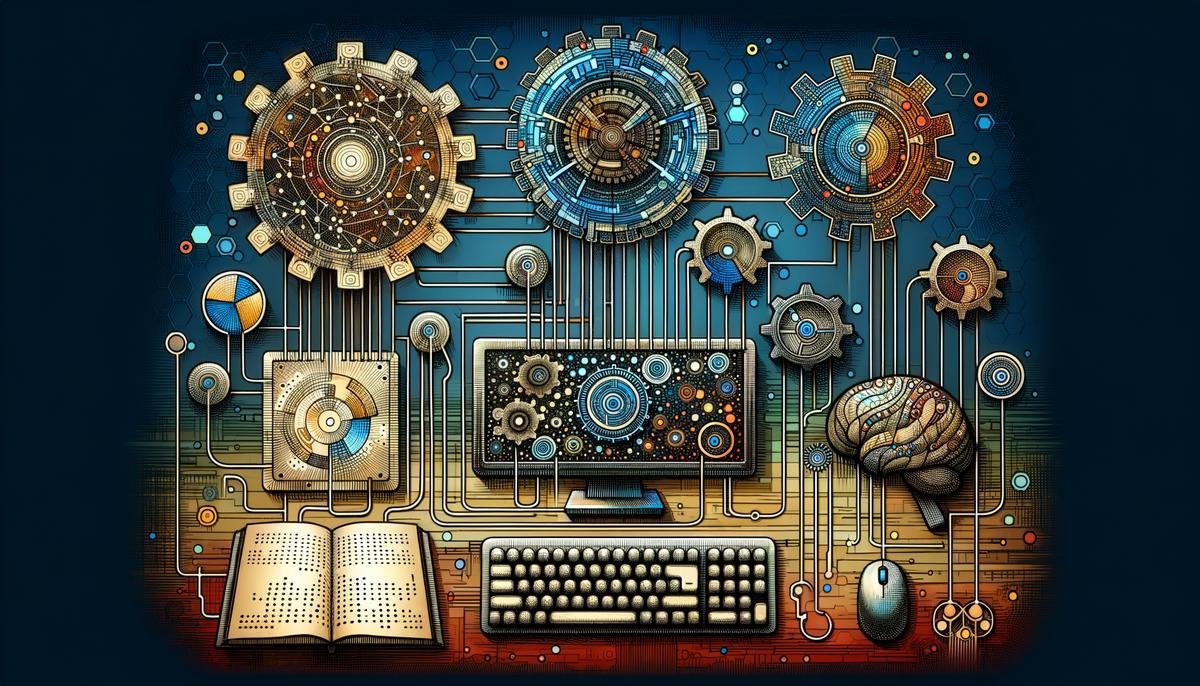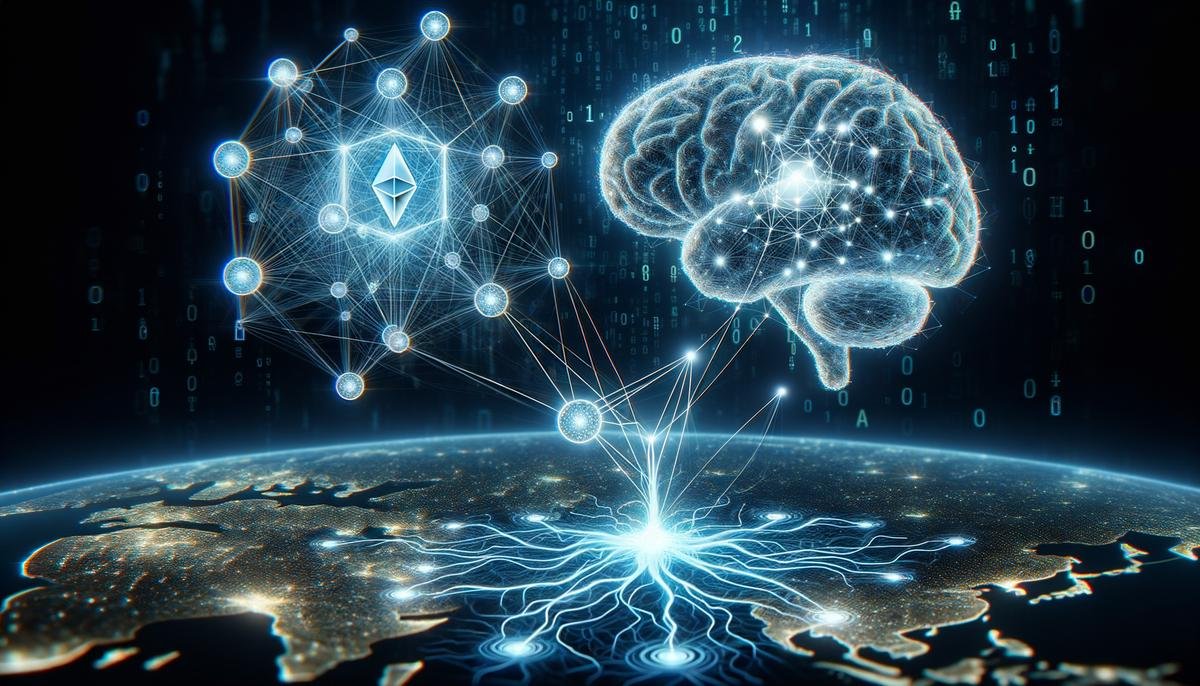As we peer into the innovative fusion of blockchain and artificial intelligence (AI), we’re stepping into a realm where technology not only advances but reshapes the very fabric of our digital interactions. This exploration sheds light on the dynamic synergy between these technologies, unpacking how they are setting the stage for a transformed future. Embracing the complexities and the boundless possibilities, let’s embark on this insightful exploration of blockchain and AI’s converging paths.
Understanding Blockchain and AI
How Blockchain and AI Work Together Like Besties
Okay, let’s dive into a topic that’s as cool as it is important: how blockchain and AI are basically becoming the dynamic duo of tech. It might sound like something straight out of a sci-fi movie, but trust me, it’s happening right here, right now. And it’s something we should all be paying a bit of attention to.
First off, blockchain is like a digital ledger that keeps records safe and sound, kind of like a diary that’s impossible to tamper with. Imagine writing down all your secrets and knowing that no one else can sneak a peek—pretty awesome, right? On the other side, AI (Artificial Intelligence) is like having a super smart robot friend who can learn, make decisions, and even predict future trends.
Now, when you mash these two technologies together, magic happens. Here’s how:
Better Security and Privacy
Imagine AI is constantly learning and getting smarter, right? But it needs a ton of data to do that. Now, enter blockchain. Its top-notch security ensures that all the info AI needs is kept safe from hackers. This means AI can keep evolving without risking our personal deets getting stolen. So it’s like having an invincible guard dog watching over your secret stash of chocolates.
Making Smarter Decisions
AI is all about making decisions, and blockchain is about recording stuff securely. When AI makes decisions, blockchain can record them in a way that’s transparent and tamper-proof. This record-keeping makes it easier to trust AI’s decisions because we can see the ‘why’ and ‘how’ behind them, no funny business involved.
Faster Learning
Blockchain isn’t just a one-trick pony; it can also help AI learn way faster. How? By giving AI access to a vast, secure, and diverse pool of data. This is like feeding your brain a steady diet of encyclopedias, but way cooler and less dusty. With more data to munch on, AI can spot patterns and whip up predictions like nobody’s business.
Trust and Transparency
One of the coolest things about blockchain is that it’s like a truth serum for data—it keeps everything honest. This transparency means we can actually trust the decisions AI makes because we know where the data came from and how it was used. It’s like having a friend who always tells you the straight-up truth, no matter what.
So, combining AI with blockchain is a game-changer. It’s not just about making machines smarter or keeping data safe—it’s about building a future where we can trust and rely on technology more than ever. From securing our personal info to making unbiased decisions and learning at the speed of light, blockchain and AI are here to shake things up.
And the best part? We’re just scratching the surface. The possibilities are endless, and who knows what awesome innovations are just around the corner. One thing’s for sure, though: blockchain and AI are teaming up to make the digital world a safer, smarter, and more reliable place. And that’s something we can all get excited about.

Introduction to SingularityNET
SingularityNET stands out in the tech world for its innovative approach to merging blockchain technology with artificial intelligence (AI). This pioneering stance isn’t just about employing two of the most buzzworthy technologies; it’s fundamentally changing how they interact, creating a synergy that could reshape entire industries. Let’s explore the unique aspects that make SingularityNET a trailblazer in this advanced tech integration.
At the heart of SingularityNET’s mission is the democratization of AI technology. Traditional AI development is often siloed within large corporations, limiting access to these powerful tools to a few dominant players. SingularityNET shatters this model by utilizing blockchain to create a decentralized marketplace for AI services. This marketplace isn’t just a theoretical concept; it’s a functional ecosystem where anyone can offer or purchase AI services. This openness ensures that smaller entities or individuals have the same access to cutting-edge AI capabilities as big corporations.
One of the key advantages SingularityNET brings to the table is the facilitation of AI interoperability. Typically, AI systems operate in isolation, built for specific tasks with little capacity to communicate or learn from each other. SingularityNET’s blockchain backbone connects these disparate systems, allowing them to share data and learning experiences. This inter-AI communication is crucial for developing more sophisticated and adaptable AI solutions that can tackle complex problems by learning from diverse datasets and methodologies.
Furthermore, SingularityNET addresses one of the persistent challenges in AI development: funding and resources. Through its decentralized platform, smaller projects and developers gain exposure to a global community of users, investors, and collaborators. This not only opens up new funding avenues through token sales and partnerships but also fosters a collaborative environment where ideas can be shared and developed collectively.
In addition, SingularityNET has a commitment to ethical AI development. The integration of blockchain introduces a layer of governance that ensures AI operations within the network are transparent and accountable. Users and developers have a say in the direction of the platform, promoting an ethical framework that guides AI development. This is crucial in an era where AI’s impact on society is under intense scrutiny.
Finally, SingularityNET is pioneering the use of AI to manage and optimize the blockchain network itself. AI algorithms can assist in optimizing transactions, managing network security, and even facilitating governance decisions. This self-improving loop, where AI enhances blockchain and vice versa, sets SingularityNET apart as a self-sustaining ecosystem that grows more efficient and capable over time.
By breaking down barriers to AI development and fostering a decentralized, collaborative, and ethical environment, SingularityNET is not just integrating AI with blockchain. It is laying the groundwork for a future where AI technology is more accessible, transparent, and democratically governed. The potential impacts on industries ranging from healthcare to finance, and beyond, are immense, making SingularityNET a true pioneer in the tech world.

Opportunities in Decentralized AI Marketplaces
Welcome to the future! Or, at least, a glimpse into a futuristic world where AI and blockchain have teamed up to bring us something straight out of a sci-fi novel: Decentralized AI marketplaces, such as SingularityNET. This innovative approach to technology integration is not just exciting; it opens up a realm of possibilities that could very well redefine how we interact with artificial intelligence. So, let’s dive into what these marketplaces offer.
First off, the idea behind decentralized AI marketplaces is to make AI technologies accessible to everyone. Think of SingularityNET as a massive, online bazaar where anyone can buy or sell AI services. This accessibility is a game-changer for small businesses or startups that previously found AI development too costly or complex. Now, they can tap into powerful AI tools without breaking the bank or needing a team of experts.
SingularityNET brings a new level of innovation by serving as a platform for AI services to connect and collaborate. Yes, AI algorithms interacting with each other! This could lead to exponential growth in AI capabilities since they can learn from a vast array of data and experiences beyond their initial programming. It’s like having a team of AI specialists from different fields working together on a project, each bringing their unique skills to the table.
What’s really cool about this setup is the way it can fast-track the development of groundbreaking AI solutions. With access to a global pool of AI algorithms, a researcher in the U.S. could, for instance, utilize a language processing tool developed in Japan, combine it with a learning algorithm from Europe, and apply it to a health diagnostics project. The potential for innovation and problem-solving is enormous, breaking down barriers and fostering a collaborative, international AI community.
Then there’s the aspect of efficiency and cost-effectiveness. By participating in a decentralized AI marketplace, developers and businesses can find specific AI services that fit their needs and budget, rather than investing heavily in developing these technologies in-house. This democratization of AI not only levels the playing field for smaller entities but also stimulates a competitive market that can drive down costs and spur further creativity.
Moreover, these marketplaces promise a more ethical and transparent AI landscape. With blockchain technology ensuring the integrity and traceability of AI services, users can be more confident in the AI solutions they deploy. This transparency is vital in sensitive fields like healthcare or finance, where the decisions made by AI can have profound impacts on people’s lives.
In addition to improving existing industries, decentralized AI marketplaces can give birth to entirely new services and business models. Imagine personalized AI health advisors accessible to anyone with a smartphone or AI-driven educational platforms that adapt to each student’s learning pace and style. The possibilities are as varied as they are exciting.
Lastly, let’s not forget the global impact. These AI marketplaces are not just about technology; they’re about empowerment. They offer a platform for innovators around the world to share their creations, opening up opportunities for technological advancement in regions that are currently underserved in the AI space. It’s a step towards a more inclusive, global tech community where good ideas have no borders.
Decentralized AI marketplaces like SingularityNET represent a bold step forward into a future where artificial intelligence is more accessible, collaborative, and impactful than ever before. By breaking down barriers to AI development and deployment, these platforms not only fuel technological innovation but also promise to reshape industries, revolutionize problem-solving, and ultimately make AI a tool for the greater good. The era of decentralized AI is just beginning, and its potential is as vast as our collective imagination. Welcome to the revolution!

Challenges and Solutions in Integration
Integrating blockchain and AI presents unique challenges, yet it’s undeniably paving the way for groundbreaking advancements in technology. One significant hurdle is ensuring seamless communication between AI systems and blockchain technology. Given their distinct architectures and operational languages, creating a common ground where these technologies can interact effectively demands innovative solutions.
SingularityNET emerges as a beacon in this intricate landscape. It introduces a decentralized protocol that not just allows AI services to communicate but also to transact and collaborate at a scale previously deemed unattainable. Think of it as a global brain where AI systems learn from each other, sharing insights and evolving together, all underpinned by the security and transparency of blockchain technology.
Another challenge lies in scalability and processing power. Blockchain, with its cryptographic processes, can be resource-intensive, and when integrated with AI, the computational demands soar even higher. SingularityNET addresses this by leveraging a network of nodes distributed globally, thus distributing the computational load and ensuring the system scales effectively to meet demand. This setup not only optimizes processing efficiency but also opens up avenues for smaller players to contribute and benefit from the ecosystem, breaking the monopolies of tech giants.
Data privacy and ownership also stand out as major concerns. In today’s digital landscape, data is gold, and its misuse is a rampant issue. Blockchain and AI together hold the promise of a more secure and private data handling mechanism. However, implementing this in practice is complex. SingularityNET introduces mechanisms where data providers retain control over their data, deciding who accesses it and for what purpose. It champions a new era where data breaches and unauthorized usage could become things of the past, thanks to its blockchain backbone ensuring data integrity and sovereignty.
Moreover, the financial barriers to entry for developing and implementing AI solutions are notoriously high. Developing AI requires significant investment, oftentimes limiting innovation to well-funded entities. SingularityNET democratizes AI by offering a marketplace where developers can monetize their AI services, providing them with the resources needed for further innovation. This approach not only makes AI development more accessible but also stimulates a vibrant ecosystem of AI services that cater to a wide variety of needs.
Regulatory and ethical compliance presents yet another challenge. As AI systems become more autonomous, ensuring they operate within ethical guidelines is paramount. SingularityNET’s blockchain infrastructure plays a crucial role here, providing a transparent and immutable record of AI operations, making it easier to audit and ensure compliance with regulatory and ethical standards.
In conclusion, integrating blockchain and AI is fraught with challenges, from interoperability to scalability, data privacy, financial barriers, and ethical governance. However, SingularityNET tackles these head-on with its decentralized platform, fostering an environment where AI systems can coexist, learn, and evolve securely and transparently. It’s not just about overcoming challenges; it’s about redefining the possibilities for AI and blockchain, setting the stage for a future where technology works seamlessly, ethically, and in service of humanity.

Future Perspectives and Real-World Applications
The convergence of blockchain and artificial intelligence (AI) is steadily moving beyond the realm of innovative experiments and into practical applications that could redefine global industries, making platforms like SingularityNET pioneers in this transformative era. But what does the future really have in store for the integration of these two powerhouse technologies?
One of the primary benefits sparked by merging blockchain with AI is the unparalleled level of data security and integrity. In a world where data breaches are all too common, enhancing data protection is crucial. Blockchain, with its immutable ledger and encryption, provides a fortress of security that, when combined with AI’s predictive capabilities, can preempt potential threats and identify vulnerabilities in real time.
Furthermore, the fusion of blockchain and AI opens up avenues for creating more personalized and efficient services. For instance, in the healthcare sector, this amalgamation could lead to more accurate patient data analysis, tailored treatment plans, and streamlined administrative processes, all while ensuring patient data privacy and compliance with regulations like HIPAA.
On the financial front, this integration promises to disrupt traditional banking and finance operations. AI, powered by blockchain’s secure and decentralized nature, can offer smarter, algorithm-driven financial advice, automate complex trading strategies, and enhance fraud detection systems. This not only increases efficiency but also democratizes access to financial services, potentially leveling the playing field between large institutions and individual investors.
Education is another sector ripe for revolution through blockchain and AI. Imagine a platform where educational content is not only widely accessible but also verifiably authentic and tailored to individual learning styles and needs. Blockchain can secure intellectual property rights and micropayments for content creators, while AI adapts learning materials to the learner’s pace and understanding, optimizing the educational experience.
However, with great potential comes great challenges. The path to harmonious blockchain and AI integration is fraught with technical, regulatory, and ethical hurdles. For one, the enormous processing power required to run complex AI algorithms and maintain blockchain networks raises environmental and cost concerns. Moreover, as these technologies become more intertwined, the regulatory landscape will need to evolve to address new privacy issues, data ownership, and ethical considerations, such as AI bias and decision-making transparency.
To navigate these challenges, platforms like SingularityNET are leading the charge, not just in technological innovation but also in creating a regulatory and ethical framework for the future. By fostering an ecosystem where developers, businesses, and consumers can collaborate and innovate, SingularityNET is not only advancing the tech frontier but also ensuring that these advancements are accessible, equitable, and beneficial to all.
In conclusion, the future of blockchain and AI integration holds immense promise, poised to redefine our digital and physical landscapes. From secure, personalized services to democratized access to technology, the potential is vast. Yet, as we forge ahead, it’s imperative that we tackle the accompanying challenges with vigilance and a commitment to creating a future that upholds the principles of security, fairness, and transparency. The journey is just beginning, and platforms like SingularityNET are at the forefront, mapping the path to a smarter, safer, and more inclusive world.

The union of blockchain and artificial intelligence is not just about technological advancement; it symbolizes a leap towards a future where trust, efficiency, and inclusivity are woven into the very core of our digital ecosystem. As we unravel the intricate tapestry of these technologies, we uncover the potential to craft a world where innovation serves humanity, harnessing the power of AI with the integrity of blockchain. This is where our collective efforts and imaginative spirit can truly flourish, pushing the boundaries of what’s possible and painting a future rich with promise and opportunity.




